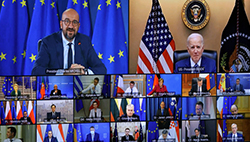Cooperating
for a Shared Future
Building Alliances & strategies
Since 2020, we have invited a range of influential people to explore ways to shore up vital connectivity amid threats to cooperation from political extremism and nationalism, polarising communications, outside interference and economic pressures. We aim to move past previous frictions and create a positive space in which British, European and American stakeholders and other key partners can debate recommendations on urgent cross-border issues like climate change, conflict, geopolitical competition, international trade and access to resources. Our mission has only got more urgent as challenges multiply, requiring ever broader and deeper global alliances.

Post Brexit UK-EU relations
UK-EU relations achieved a welcome boost in early 2023 with the “Windsor Framework” agreement which resolved disagreements over the Northern Ireland Protocol and unblocked cooperation on other fronts. In our roundtables, many UK businesses praised the pragmatism and political will on both sides and were looking forward to next steps.
Read more

America’s Leadership Role
The topic of America’s global leadership is prevalent amid systemic challenge from China and Russia against perceived Western hegemony. Transatlantic cooperation has accelerated since Biden’s election due to Russian aggression, the pandemic and disruption to globalisation and supply of resources. His administration has reinstated the US as prime mover in areas of strategic importance for Western allies by rejoining the Paris agreement on climate change and net-zero goals, underwriting European security and leading in NATO; cooperating on joint regulations in AI, technology and security resilience.
The US, UK and EU hold common ground on fundamental positions, despite differences, and need to strengthen alignment as global competition threatens resources, globalisation and overall stability. Upcoming elections in 2024 in the UK, US and EU will affect relations as politics shifts further to the right amid national insecurities and ongoing populist trends.
Read more

